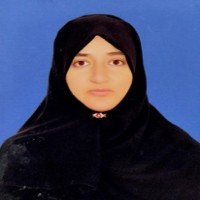|
Isbah Nisar Nighat Younas, Saima Aftab
Gender Stereotypes And Its Impact On Socialization Of Children In Rawalakot Azad Kashmir
The study was conducted to identify the existence and impact of gender stereotypes in socialization of children in Rawalakot Azad Kashmir. The nature of the study was quantitative. The educated parents in Rawalakot were population of study. The teaching faculty of public sector schools and colleges in Rawalakot Azad Kashmir were taken as sample of the study. A sample of 200 parents was chosen by using purposive sampling techniques. To analyze the existence of stereotypical traits of gender in so
|
2023 |
|
|
|
Nighat younas1 , Saima aftab2 , Isbah Nisar3
Comprehensive Study Of Student’s Criminal Activities In Educational Institutes
The main purpose of education is to reduce crime in the society, but instead of this crime is also found in educational institutions (e.g. Smoking, Bunking, Fighting with other, Cheating destroy the college Universities property)and behind these crimes there are different reasons (e.g. Stress, Parent problem, bad company), Get support Without any reason, After punishment) when a student commits crime it create a problem not only for him but also for another student and it disturbs the college/U
|
2023 |
|
|
|
Saima aftab1, Nighat younas2, Isbah Nisar3
Early Marriages And Its Impact On Fertility In Rawalakot Ajk, Pakistan
Marriage is one of the universal social institutions established to control and regulate the life of mankind. It is the approved social pattern whereby two or more persons establish a family. However, marriage, which occur without natural way or which violate the basic principles of human rights, creates critical social problems with multifaceted consequences. The current study investigates into various causes and consequences of early marriages and its impact on fertility in Rawalakot Azad Kash
|
2023 |
|
|
|
Nisar, Isbah; Younas, Nighat; Aftab, Saima
Opportunities and Barriers affecting Women Entrepreneurship of Rawalakot, Azad Kashmir Pakistan
The study presents a comprehensive snapshot of current situation of the economic empowerment of the women of Rawalakot AJK. In this paper the significance of women entrepreneurship their limitations and barriers for women empowerment in Rawalakot, AJK Pakistan is addressed. The study focuses on the barriers that women business owners face, analyze their operational environment, and primarily discusses family support, the dominating gender inequities. The 40 women who were chosen for the study ca
|
2022 |
|
|
|
Saima Aftab, Nighat Younas, Isbah Nisar
Comparison between Working And Non-Working Women in Household Activities in Decision-Making Patterns
The purpose of the study is to find out the women’s participation in household activities. It compares the decision-making patterns among working and non-working women and evaluates the challenges and hurdles faced by them in household economic activities.
|
2022 |
|
|
|
Nighat Younus, Saima Aftab, Isbah Nisar
Socialization Pattern of Orphans in Orphan Houses of Rawalakot and its Impact on their Lives
Socialization are the transfer and exchange of norms, values, beliefs, and behaviors to next generation. When growing age is passing some nutrition from society in form of behavior, love, care and affection needed to make its valuable personality. The psychological and mental problems of orphans can cause social disorders unnecessary anxiety, tensions and in later feeling of unhappiness. The majority public opinion is of that mostly the orphans show anti-social behaviour but this is not valid or
|
2022 |
|
|
|
Nighat Younus, Saima Aftab, Isbah Nisar
Stability of Drug addictive and Depressive People for the Development of Society
Depression is a major public health concern in every community and country. Depression has long been considered an important target of mediation in brain research and psychiatry. Both professions have focused their efforts mostly on therapy rather than prevention. Despair is a major condition; as a result of sadness, many people become addicted to drugs and forget about their depression. The society also plays a significant part in the rehabilitation of drug addicts and depressed people, as well
|
2022 |
|
|
|
Saima Aftab, Nighat Younas, Isbah Nisar
IMPACT OF COVID-19 ON EMPLOYMENT STATUS IN RAWALAKOT
This study aims to look into the relationship between COVID-19 and their undesirable influences on unemployment, functional well-being, and social status. Covid-19 has wreaked havoc all over the world. The current situation was critical at the time, and not just one area was susceptible to infection, but virtually every state, including the world's largest economy, was affected. This study was unique in its nature in its attempt this study looks at different parameters in COVID-19 scenarios. Ana
|
2022 |
|
|
|
Adeel Iftikhar, Nighat Younas, Isbah Nisar
UNRAVELING THE UNNOTICED: A CASE STUDY OF COMMUNITYBASED MASJID AS AN INSTRUMENT OF SOCIAL CONTROL
This ethnographic study explains the social organization of a community-based masjid, located in a rural area on the northern border of Pakistan. The particular focus is on the manner the community-based masjid contributes as an agent of social control in immediate surroundings. Lesson class for religious education of young boys and namaz-e-jumma (Friday congregational prayer) are identified as two main mechanisms for maintaining social control in the masjid and beyond. It is argued that while t
|
2021 |
|
|




